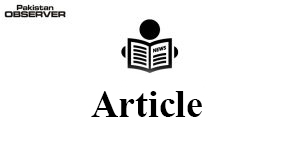Recipe for societal progression
ERADICATION of poverty from a society goes hand in hand with its socio-economic uplift.
The logical corollary of these twin phenomena is spiralling up the Human Development Index (HDI) and availability of better living standards for its members by affording them nutritious food, decent accommodation, quality education, better healthcare, lower gender inequalities and more civic amenities.
It goes without saying that continuity and consistency of poor-friendly Government policies both at the Federal and grassroots levels is a must to reap full fruits of this hard-earned socio-economic development in a society.
Major Government policies in this regard include effective social safety nets and targeted subsidies for the downtrodden; ease of doing business for the entrepreneurs; affordable electricity, gas and other commercial utilities for the businesses to thrive: and progressive income and withholding tax regime.
Practical examples of Scandinavian countries in the West and Singapore and China in the East bear vivid testimony to the efficacy of protracted and consistent Government policies aimed at socio-economic uplift of the masses.
China’s remarkable achievement in bringing around 800 Million people out of the cruel clutches of extreme poverty in the last four decades needs honourable mention.
Besides China, Singapore is the only country which transformed into a bustling first-world country from an underdeveloped third-world country just in a lifespan of a single generation after its independence from Malaysia in 1965.
A critical appraisal of all welfare states of Americas, Europe, Far East and South East Asia reveals that unemployment benefits for the out of work community members, better education and healthcare coverage for all, free legal aid for the destitute and targeted subsidies in the essential commodities and basic utilities for the deserving are their hallmarks.
A cursory glance at the social and legal orders of early Islamic communities, especially that of Riyasat-e-Madina founded by the greatest visionary of all time: our beloved Prophet Hazrat [M] (SAWW), reveals how fair, just and philanthropist they were in their character.
Care for the needy, help for the poor, sympathy for the oppressed, and symbiotic code of ethics for the haves and have nots to ensure peaceful coexistence were at the core of their values System.
Very much cognizant of this trodden path to prosperity, Government of Pakistan launched Ehsaas Programme as an umbrella initiative to steer all kinds of interventions aimed at the socio-economic welfare of its people, especially for those in the lower, middle and lower middle income categories.
With a manifest aim to provide effective and comprehensive safety nets for the marginalised and the vulnerable, Ehsaas Programme rolled out Ehsaas Kafaalat on 31 January 2020.
Under this program monthly cash handouts @ Rs 2000 per household is distributed among 7 Million poorest and the most deserving women in the country on the basis of a digitally enabled Ehsaas survey.
Ehsaas Amdan (Income) Programme, launched in February 2020, is aimed at creating opportunities for the most disadvantaged people through the transfer of small income-generating assets in 23 districts across Pakistan.
In this Rs 15 billion project, 60,364 productive assets worth Rs. 3.62 billion have been transferred to the ultra poor and vulnerable poor households till 30 June 2021.
Ehsaas Interest Free Loans (IFL) Programme is a major component of the National Poverty Graduation Initiative.
By the end of the first year since its launch in July 2019, 1.35 Million interest free loans worth Rs. 47.77 billion have been disbursed, 46% of which are secured by female borrowers.
Acclaimed by the World Bank, Ehsaas Emergency Cash (EEC) is one of the most effective programmes world wide under which Government of Pakistan delivered Rs. 179.8 billion as one-time emergency cash assistance @ Rs. 12000 per household to 14.8 million families at the risk of extreme poverty in phase-I, whereas additional four million deserving households are catered to under Phase-II of the programme to offset critical financial miseries induced by COVID-19 pandemic.
Conditional Cash Transfers (CCTs) like Ehsaas Education Conditional Cash Transfers, Ehsaas Nashonuma (health and nutrition) Conditional Cash Transfers are also remarkable interventions of the Government for the promotion of primary, secondary and higher secondary levels education through graduation stipends in 154 districts across the country, and the provision of special nutritional food for pregnant and lactating women (PLW) and children less than two years of age through quarterly cash stipends.
Ehsaas Langars and Ehsaas Koye Bhooka Na Sooye are innovative programmes for the supply of meals twice a day to the poor and daily wage earners in major cities across Pakistan.
Under these programmes, each Langar is serving two meals every day to 600-800 poor people, whereas food trucks are delivering free of cost meals twice a day to daily wage earners in Islamabad, Rawalpindi, Lahore, Faisalabad, Peshawar and Gujranwala.
Panahgahs (shelter homes), Dar-ul-Ehsaas/Orphanages and Child Care Centres being run under the umbrella of Ehsaas Programme are offering quality shelter and life care facilities to the marginalised sections of the society.
Keeping the global best practices in view, it can easily be concluded that Pakistan can become a true welfare state like Riyasat-e-Madina if we could ensure continuity and consistency of philanthropic policies both at the Federal and provincial/regional levels in the years to come.










